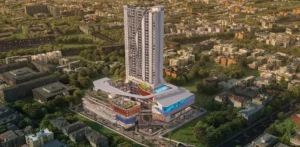
Introduction
In the ever-changing world of property and development, staying abreast of the latest Trend in Real Estate is crucial. These trends not only reflect the current economic and societal dynamics but also shape the future of the industry. In India, these changes are particularly pronounced, offering unique insights and opportunities. This blog delves into the current trends in the Indian real estate market, examining how they are influencing the sector and what they mean for investors, developers, and consumers.
The Current Landscape of Real Estate Trends
The landscape of real estate trends is continually evolving, shaped by a multitude of global and regional factors. In recent years, these changes have been particularly pronounced, reflecting a shift in how people live, work, and invest in property.
1. Global Influences on Local Markets
The real estate market is increasingly globalized, meaning trends in one part of the world can have ripple effects elsewhere. Technological advancements, economic shifts, and changes in international trade and investment policies are influencing real estate markets around the globe, including India.
2. The Digital Revolution in Real Estate
Technology has revolutionized the real estate industry. From virtual property tours to blockchain-based transactions, digital innovations are making real estate more accessible and transparent. These technologies are not only changing how properties are marketed and sold but also transforming property management and development.
3. Sustainability and Green Living
There is a growing emphasis on sustainability in the real estate sector. Eco-friendly building materials, energy-efficient designs, and green living initiatives are becoming standard practices. This shift is driven by both environmental concerns and consumer demand for healthier, more sustainable living spaces.
4. Changing Demographics and Urbanization
Demographic shifts, such as the growing number of millennials entering the housing market and the increasing urbanization, are significantly impacting real estate trends. These factors influence the types of properties in demand, with a noticeable shift towards mixed-use developments that combine residential, commercial, and recreational facilities.
5. The Rise of Remote Work
The recent surge in remote work is altering residential and commercial real estate trends. On the residential front, there is an increased demand for homes with dedicated office spaces. In the commercial sector, this has led to a reevaluation of office space requirements, with some businesses downsizing physical offices in favor of flexible co-working spaces.
6. Investment Patterns and Market Volatility
Economic uncertainty and market volatility can greatly affect real estate trends. Investors are seeking properties that offer stable returns, leading to a rise in interest in residential properties over commercial ones in some markets. Additionally, there is a growing trend towards diversification in real estate investments, spreading risks across different types of properties and geographical locations.
7. Government Policies and Regulatory Changes
Government interventions, such as tax reforms, housing policies, and infrastructure development projects, play a significant role in shaping real estate trends. These policies can either stimulate or restrain the growth of the real estate market, influencing investment decisions and development patterns.
In summary, the current landscape of real estate trends is a complex interplay of global influences, technological advancements, environmental considerations, demographic shifts, and economic factors. Understanding these trends is crucial for anyone involved in the real estate sector, from developers and investors to buyers and sellers.
Real Estate Trends in India
The latest real estate trends in India are a blend of innovation and adaptation. Technology, particularly in the form of digital transactions and virtual realty tours, has become more prominent. Sustainability is another critical focus, with eco-friendly and energy-efficient designs gaining traction. Additionally, consumer preferences are shifting towards more integrated living spaces, combining residential, commercial, and leisure facilities.
Trend of Real Estate Market in India
The real estate market in India has undergone significant transformation in recent years, marked by several emerging trends that are reshaping the sector. These trends not only reflect the evolving preferences of buyers and investors but also indicate the future direction of the market.
1. Affordable and Mid-Income Housing
One of the most significant trends in the Indian real estate market is the growing demand for affordable and mid-income housing. This shift is driven by a large, young population and increasing urbanization, coupled with government initiatives like Pradhan Mantri Awas Yojana (PMAY) aimed at promoting affordable housing.
2. The Rise of Tier II and Tier III Cities
Real estate development is no longer confined to the major metros. Tier II and Tier III cities are witnessing a surge in real estate activity, fueled by infrastructural development, improved connectivity, and more affordable property prices compared to the metros. This decentralization is creating new investment opportunities and diversifying the real estate market.
3. Technology Integration
The adoption of technology in the real estate sector has accelerated, with virtual reality (VR) and artificial intelligence (AI) enhancing customer experience and operational efficiency. Digital platforms for property listing, virtual tours, and online transactions are becoming increasingly popular, facilitating a more seamless and efficient property buying process.
4. Sustainable and Smart Developments
There is a growing emphasis on sustainability and smart features in real estate projects. Eco-friendly constructions, energy-efficient buildings, and smart home technologies are in high demand among environmentally conscious buyers. This trend is encouraging developers to incorporate green building practices and smart features in their projects.
5. Co-working and Flexible Workspaces
The trend of co-working spaces and flexible work environments has gained momentum in India, especially in the wake of the COVID-19 pandemic. These spaces offer flexibility, networking opportunities, and cost-effectiveness, appealing to startups, freelancers, and even large corporations rethinking their workspace strategies.
6. Retail and Warehousing Boom
The e-commerce boom in India has led to a growing demand for warehousing and logistics facilities. Similarly, the retail sector is evolving with the integration of technology and experiential shopping, leading to the development of modern retail spaces that offer more than just shopping.
7. Real Estate Investment Trusts (REITs)
The introduction of REITs in India has democratized investment in commercial real estate, making it accessible to individual investors. This trend is providing a new avenue for investment and is expected to bring more transparency and liquidity to the real estate market.
8. Regulatory Reforms
The implementation of regulatory reforms like the Real Estate (Regulation and Development) Act (RERA) and Goods and Services Tax (GST) has brought more transparency and accountability to the real estate sector, boosting investor confidence and paving the way for healthier market growth.
In summary, the trend of the real estate market in India is characterized by a shift towards affordability, technological integration, sustainable development, and diversification into new segments and geographies. These trends are not only shaping the current market landscape but are also setting the stage for future growth and development in the sector.
Future Predictions and Opportunities
The real estate market, always dynamic and evolving, is poised for significant changes in the coming years. Understanding these future trends is crucial for investors, developers, and consumers looking to capitalize on the opportunities they present. Here are some predictions and opportunities that are likely to shape the future of real estate:
1. Increased Demand for Sustainable and Green Living Spaces
As environmental awareness grows, the demand for eco-friendly and sustainable living spaces is expected to surge. This trend presents an opportunity for developers to innovate with green technologies, energy-efficient designs, and sustainable materials. It also offers a niche market for investors focused on eco-friendly real estate projects.
2. Smart Homes and Automated Technologies
The integration of IoT and smart technologies in residential and commercial properties is anticipated to become more prevalent. This advancement offers opportunities for developers and tech companies to collaborate on creating more intelligent, connected, and efficient living and working environments.
3. Shift Towards Mixed-Use Developments
There is a growing trend towards mixed-use developments that combine residential, commercial, and recreational spaces. These developments are designed to offer convenience and a better quality of life, which could attract a broader range of buyers and tenants.
4. Rise of Secondary Cities
As property prices in primary cities continue to soar, secondary cities and suburbs are likely to see increased real estate activity. This shift could open up new investment opportunities in these areas, offering potential for higher returns due to lower initial investment costs.
5. Remote Work Influencing Residential and Commercial Real Estate
The normalization of remote work is expected to continue impacting real estate trends. On the residential front, this may lead to an increased demand for properties with dedicated home office spaces. For commercial real estate, this could mean a continued demand for flexible and co-working spaces.
6. Technological Advancements in Construction
The future of real estate will also see a revolution in construction technologies. Innovations like 3D printing and modular construction could reduce building times and costs, offering opportunities for cost-effective and rapid development of properties.
7. Real Estate as a Service (REaaS)
The concept of Real Estate as a Service is gaining traction, where real estate is not just about selling a property but providing an ongoing service. This could include maintenance, upgrades, and other value-added services, opening up new business models for the real estate industry.
8. Investment in Infrastructure Development
Significant investments in infrastructure development are likely to boost the real estate market. Improved transportation, utilities, and public services can make certain areas more attractive for both residential and commercial development.
Conclusion
Keeping pace with the Trend in Real Estate is essential in today’s fast-moving market, especially in a diverse and rapidly developing country like India. For those looking to navigate these waters, expert advice is invaluable. This is where a consultancy like ADX CORP in Gurgaon comes in. With their deep understanding of the real estate trends in India and expertise in the Trend of Real Estate Market in India, ADX CORP can provide the guidance needed to make informed decisions in this dynamic market.

Aayush Thakur
Recognized as one of Gurgaon's elite real estate consultants, Ayush Thakur has transformed the cityscape with insightful strategies, unparalleled expertise, and a keen sense of market dynamics. A trusted name in property advisory.







